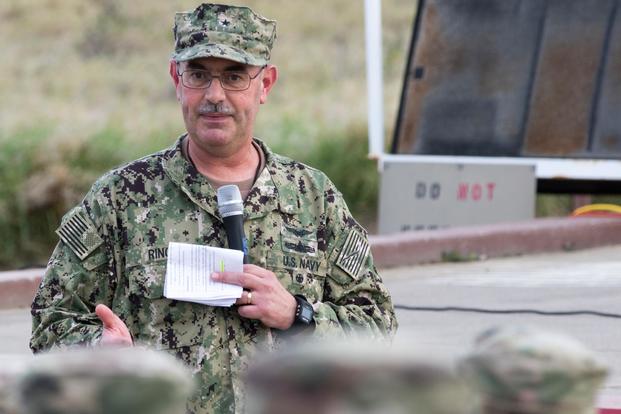Just one day before his abrupt firing as commander of detention facilities at Guantanamo Bay, Cuba, Rear Adm. John Ring said publicly that detainees there may not be receiving adequate medical treatment.
Adm. Craig Faller, commander of U.S. Southern Command, relieved Ring as the head of Joint Task Force-Guantanamo on Saturday due to a loss of confidence in his ability to command.
On Friday, Ring was quoted in a Defense One article as questioning the U.S. policy that prevents the transfer of detainees to the United States, even in the case of a medical emergency.
"I'm sort of caught between a rock and a hard place," Ring said in Defense One. "The Geneva Conventions' Article III, that says that I have to give the detainees equivalent medical care that I would give to a trooper. But if a trooper got sick, I'd send him home to the United States. And so I'm stuck. Whatever I'm going to do, I have to do here."
Ring was scheduled to move onto another assignment after a change of command in June, but his abrupt firing "had nothing to do" with his comments in the Defense One story, Army Col. Amanda Azubuike, spokeswoman for SOUTHCOM, told Military.com on Monday.
Guantanamo Bay currently houses 40 detainees, including Khalid Shaikh Mohammed, who allegedly planned the Sept. 11, 2001, attacks.
Ring was also quoted as saying that some of the detainees are "prediabetic" and could develop serious health conditions as they get older.
"Am I going to do dialysis down here? I don't know. Somebody has got to tell me that," he told Defense One. "Are we going to do complex cancer care down here? I don't know; somebody has got to tell me that."
Ring was relieved as a result of an investigation that began in March and ended in mid-April, before the Defense One story was published, Azubuike said.
The New York Times reported Sunday that Ring had been outspoken in the past about the facilities at Guantanamo Bay. Last June, he told reporters that the "top-secret prison where the military segregates high-value detainees, called Camp 7, would become inadequate as the prisoners aged," according to The New York Times.
The timing of Ring's firing seemed interesting, however, to human rights attorney Patricia Stottlemyer, who posted this tweet Sunday:
"JTF GTMO commander is fired days after he stated that the inadequate medical care at #Guantanamo placed him at odds with his obligations under the Geneva Conventions. There's a statutory bar on transferring detainees to US even for emergency medical care."
The bar on transfers has been part of the National Defense Authorization Act for several years, Stottlemyer told Military.com in an interview.
"The Senate has, for several years, included in its version of the NDAA a provision that would allow for the temporary transfer of detainees to the US for emergency medical treatment, but it has not made it into the final bill," said Stottlemyer, an associate attorney at Human Rights First, an independent advocacy organization.
Guantanamo Bay was also in the news recently as a potential site under consideration by the Department of Homeland Security for detaining migrant children apprehended at the U.S.-Mexico border, several media outlets reported.
"It's a terrifying prospect that we detain migrant children at all, but certainly putting them somewhere where they would have less access to adequate medical care ... it makes that independent monitoring and providing adequate care for these children much more difficult," Stottlemeyer said.
-- Matthew Cox can be reached at matthew.cox@military.com.












